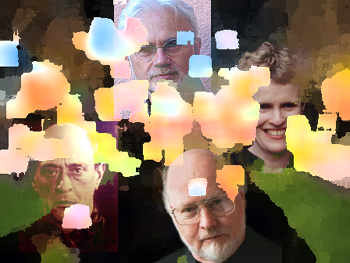|
Are There Any Modern Classical Composers?By John Joyce This article cites numerous musical artists and reveals many modern classical composers, many of whom you know already.
Modern living classical composers are always at the bottom of a ravine. On one side of the ravine are dead famous composers such as Beethoven, Mozart and Rachmaninoff, and on the other side, pop composers. Can you name any modern-day classical composers? Did you know there were any? Did you know you already know many of them? Well, there are: R. Murray Schaeffer, Andre Gagnon, Peter Maxwell Davies, Richard Rodney Bennett, Sir Arthur Bliss, Peter Sculthorpe, Philip Glass, John Cage and Steve Reich. Are they any good? Well, maybe. Difficult to listen to? Generally, yes, when they are not writing for film or television. Are they still alive? Generally, yes, or only died recently. Nina Rota died in 1979. His music is better known than his name: Godfather and Romeo and Juliet theme music. But did you realize that many famous classical composers died not so long ago? Igor Stravinsky (1971) and Aaron Copland (1990). Some of our pop icons died before them, such as Jimi Hendrix (1970) and Jim Morrison (1971). I wrote the following e-mail to a friend living in another country: “Can you send me the names of at least three modern national classical composers? You know, the type that get a big fat commission from the government or are composers in residence on a sinecure at a university and write a couple of unintelligible pieces of rubbish in three movements labelled adagio largo and allegro con fuoco, all based on a poem that two people in the world have heard of, one being the poet. The piece gets a couple of forced performances by a bankrupt symphony just before the intermission to an audience that came to hear Mstislav Rostropovich. A couple of CDs are pressed and sold to retirees at the intermission.” A little disparaging but accurate. What do we mean by classical music? Modern classical music has many genres such as minima, electronic, operatic, choral, and ballet. Never far away are the long shadows of pop, folk rock, blues and jazz. Much modern classical music is difficult to listen to, but so is Jimi Hendrix. With modern classical music, we are sceptical if it is worth the effort and thus run back to baroque music or French impressionist music such as Debussy, Satie, Ravel and Faure. Before getting there, maybe Stravinsky’s "Rite of Spring" is a good rest stop. Why is modern classical music difficult to the ear? Because it is not as melodic as the old masters. Arnold Schonberg (1874 1951), with his twelve-tone system ways, can be blamed for this trend. New composers wish to take us somewhere new musically, but it is hard work listening to Thomas Adès’s “Living Toys” during breakfast. However, if it is easy, we are suspicious. Remember your school days! English literature classes! Best-selling books were not good literature: they were too easy to read. So the thinking persists that, if the music is popular, then it can’t be any good; and the masses have never known what is good for them. However, I suspect that most modern-day classical composers yearn to create music like Benny and Bjorn, Andrew Lloyd Webber, and of course, Lennon and McCartney. If not for the fame, well, then for the mortgage’s sake! There is always a danger with modern composers of writing clever technical music with no soul and being revered only by other composers, thus becoming the ill-fated composer’s composer. Of course, many just want to play jazz. Most symphony orchestras are technically bankrupt and, for the last 200 years, might be considered Beethoven and Mozart tribute bands, with the occasional cover of Tchaikovsky and Mendelssohn. Good news: opera is alive and well. Filumena is an opera portraying the last Canadian women hanged in Canada. Beatrice Chancy is about black slavery in Nova Scotia. Iron Road is the usual "immigrant doing well" theme. Margaret Atwood’s The Handmaid’s Tale is now an opera playing in London. Then we have operas written by John Adams: Nixon in China and The Death of Klinghoffer. The Death of Klinghoffer was recently made into a multimedia production. A word on ballet. Ballet British Columbia choreographed, As above, so below, music by John Adams. Of course, for some, ballet is merely a Pilates session set to music, with provocative leaping and touching. John Williams conducts Boston plus can boast of compositions such as Star Wars. Danny Elfman is professionally pleased, plus financially comforted, to have written the theme music for The Simpsons. When Ennio Morricone eats out in Milan, he need not look at the prices on the menu; he wrote music for most of those spaghetti westerns. Hans Zimmer wrote the music for The Lion King. Local boy Howard Shore wrote the music for Lord of the Rings. Marvin Hamlish bills himself as a composer, but it as Barbara Streisand’s music arranger that he will be remembered. The Canadian David Foster knows his motives subdominants of any key, but it’s as Celine Dion’s arranger that gets him the window seat. So are these people classical composers or pop composers? Yes! Have you noticed that there are not many female composers? Well, there is the English Rachel Portman, who has a degree in music from Oxford and won an Oscar for the Emma film music. She was at Oxford with Hugh Grant, which is a bit like learning that Keith Richards fell off a ladder in his library. Henryk Gorecki and his symphony no 3 opus no 36 and John Taveners’s The Protecting Veil, made the magazines and the listings a few years ago. There are oodles of living classical composers, and the Trio Phoenix and Kronos Quartet often showcase their works. Do we have responsibility to support living artists? Well, certainly! Let’s not wait for us all to be dead!
|
